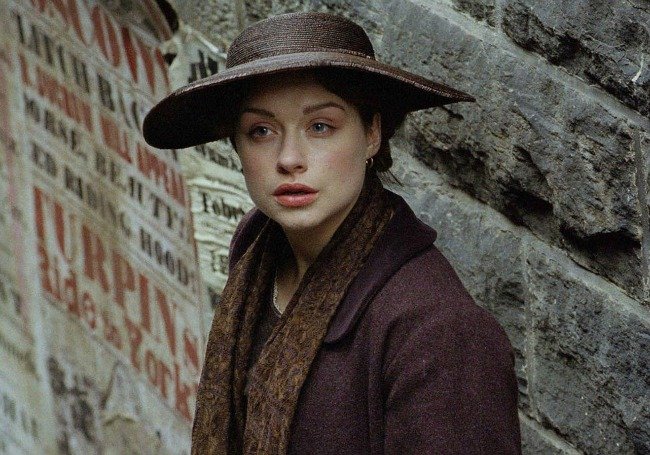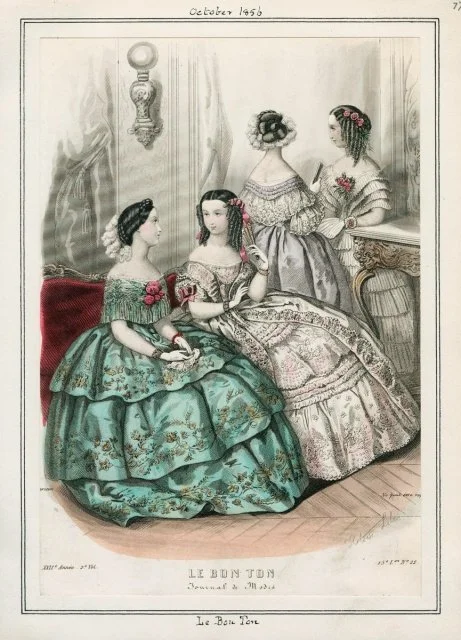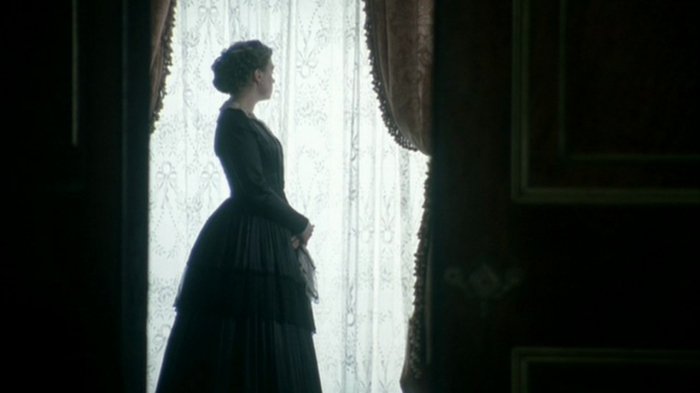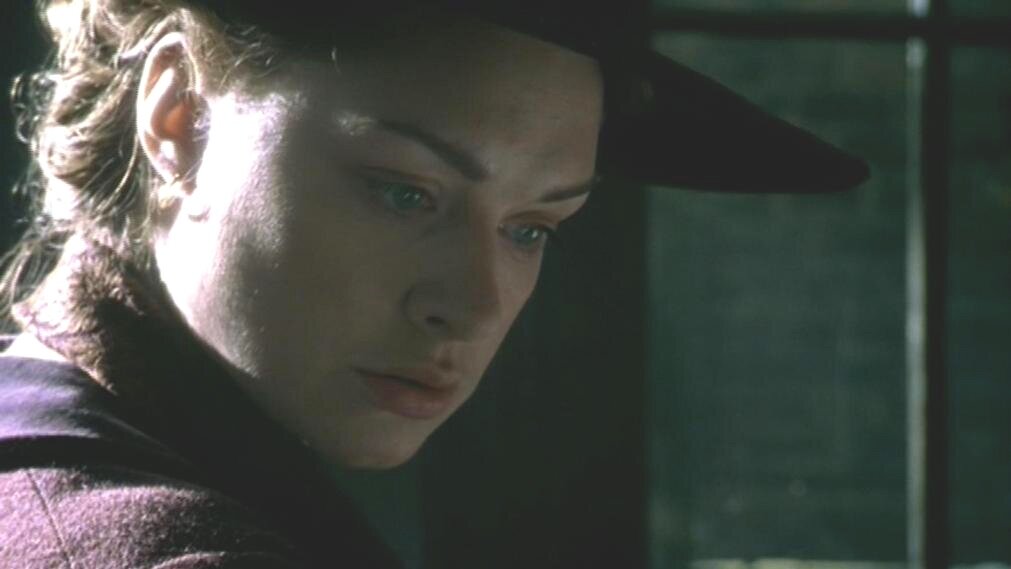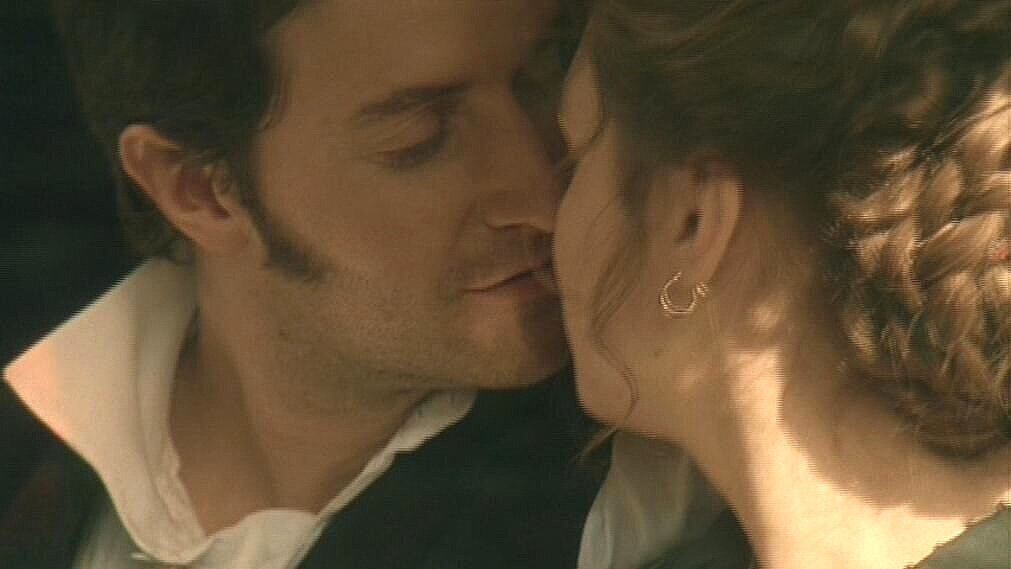The clothes women wear conform to the style, decorum, and cultural approval of the day. It was only a half century ago when women in Western cultures were freed from the stricture of always wearing skirts and dresses. Throughout the 1970s it became more and more acceptable for women to wear ….pants (gasp!).
Previous ages were far more strict as to what the appropriate mode of dress of women was. We are all aware that in the Victorian Era, both men and women wore what would be considered unreasonable layers of restrictive clothing today.
There were always choices, however, for those who had the means to purchase new clothing. And since Margaret Hale was a girl of the Victorian Era, she couldn’t overthrow the rules of dress alone even if she had wanted to. But she could, and did, choose to wear clothing that reflected her values.
Apparel becomes a focus in the very first chapter of Elizabeth Gaskell’s North and South, where Margaret models Edith’s luxurious Indian shawls for Aunt Shaw’s friends. Right away, we discover that although Margaret enjoys and appreciates the beauty of these expensive shawls, she has no particular desire to possess them. She doesn’t feel a need to wear or have impressive, fancy clothes.
She is, in fact, exhausted by all the running around required to coordinate the perfect wedding for her cousin Edith, which undoubtedly included much shopping for an extravagant trousseau. Margaret, by contrast, describes her wish for a simple wedding with very little fuss. Margaret doesn’t see the need for spending time and effort over appearances. She hones in on the essentials of life - the meaning behind events. Margaret doesn’t dream of putting on a show for others at her wedding.
Thornton fell for her in this get-up?
Margaret Hale is very comfortable and confident in her own individuality. She doesn’t feel the need to imitate anyone or to draw attention to herself. She prefers to dress in pleasant clothing without much ornamentation. She’s a no-nonsense, down-to-earth country girl at heart.
Thornton notices her style at the outset when he sees her for the very first time in the hotel sitting room. It’s her dignity and commanding presence that strikes him, and part of this is conveyed in what she wears. She’s not dolled up in frilly ruffles and ostentatious patterns or plumes. She’s dressed simply and carries herself with a natural, self-confident pride. It’s this strength of character – not needing to dress in flamboyant style to feel important – that attracts Thornton.
...a young lady came forward with frank dignity, — a young lady of a different type to most of those he was in the habit of seeing. Her dress was very plain: a close straw bonnet of the best material and shape, trimmed with white ribbon; a dark silk gown, without any trimming or flounce…
According to the original novel, when Thornton comes to tea at the Hales it is only the second time he’s ever seen Margaret. While he’s checking out the comfortable details of the Hales’ home, he is definitely taking a careful look at Margaret:
She stood by the tea table in a light-colored muslin gown, which had a good deal of pink about it. She looked as if she was not attending to the conversation, but solely busy with the tea-cups, among which her round ivory hands moved with pretty, noiseless daintiness.
Margaret appears to him as the very image of feminine grace here. Her blouse in this scene is very light and delicate. She is a woman, and naturally expresses the soft, tender caring for others that is characteristic of the feminine nature. She can be both strong and confident and gentle and caring. The soft look of feminine clothes also suits her.
This balance between masculine and feminine characteristics in Margaret is fascinating to Thornton. He sees both sides of her character, her practical strong side and her more tender, sweet side.
Did you know that Thornton is noticing Margaret’s every outfit? He is.
Gaskell lets us know that Thornton is noticing Margaret’s wardrobe along with everything else about her! It’s really quite endearing that he remembers every visual image of her.
After she cruelly rejects him, he wanders the country dazed with the pain of her refusal, thinking about her:
He only caught glimpses of her.; he did not understand her. He saw her in every dress, in every mood, and did not know which became her the best. Even this morning, how magnificent she had looked, — her eyes flashing out upon him at the idea that, because she had shared his danger yesterday, she had cared for him the least!
Now, what about Margaret’s drop-dead dinner party outfit? Was it too feminine? Was it too revealing? Did wearing it degrade her — or empower her?
Clearly, this elegantly coifed and presented Margaret is a far cry from the everyday Margaret Hale who wears dull brown and traipses around Milton with a nondescript frisbee hat instead of a dainty bonnet. (See an earlier blog post about bonnets in North and South)
This is not a practical dress in the least. It’s an evening dress appropriate for formal social gatherings in that era. But note how Margaret’s dress compares with Fanny’s. Margaret’s gown has no fringes, flounces, lace, or contrasting colors. Her gown is a simple solid color with a tasteful embellishment of ruffled fabric for the sleeves and neckline.
Margaret’s dress conforms to the dress code appropriate of her day, yet she chooses a more subtle style. Here’s a great drawing of the evening gowns of the 1850s, the decade North and South was published.
Remember now, Margaret didn’t even really want to go to the dinner party. She went because her mother wanted her to go. And Margaret let her mother decide what dress she would wear. She herself was not concerned about impressing anyone. Her thoughts were far more consumed with the suffering of the strikers, the Boucher family and Bessy Higgins.
What had possessed the world (her world) to fidget so about her dress, she could not understnand…
Despite Margaret’s rather nonchalant attention to her attire for the Thornton dinner party, she looked fabulous! Her dress showed off her ample figure, as it was supposed to. And her natural dignity and grace made her stand out from the crowd. She was a commanding presence in very feminine attire. According to the book, at least two dinner party attendees asked about “that fine distinguished-looking girl.” She caused quite a stir!
And did John Thornton notice?
Did he ever!
He was struck anew with her great beauty. He had never seen her in such dress before; and yet now it appeared as if such elegance of attire was so befitting her noble figure and lofty serenity of countenance, that she ought to go always thus apparelled.
I summed up Thornton’s strong attraction to Margaret’s kind of beauty fairly well in a previous post:
The beauty he sees in her is tied to the qualities she exudes: self-possessed dignity, serene freedom, natural grace, gentle frankness, unshrinking self-confidence and strength. He seems to discern the essence of Margaret Hale in one short occasion. She's a rather amazing blend of both masculine and feminine natures. And Thornton is drawn to her expression of these qualities, so many of which he himself possesses and venerates.
Margaret Hale wears her clothes well, they represent her practical, sensible side and the tender caring nature at her core.
She would definitely have loved to see the introduction of trousers for women in the coming century!

